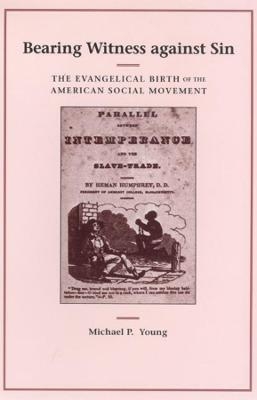
Bearing Witness against Sin
The Evangelical Birth of the American Social Movement
Seiten
2007
University of Chicago Press (Verlag)
978-0-226-96085-2 (ISBN)
University of Chicago Press (Verlag)
978-0-226-96085-2 (ISBN)
- Titel z.Zt. nicht lieferbar
- Versandkostenfrei
- Auch auf Rechnung
- Artikel merken
During the 1830s, the United States experienced a wave of movements for social change over temperance, the abolition of slavery, anti-vice activism, and a host of other moral reforms. This title argues that together they represented a distinctive style of mobilization. It is a revelatory account of how religion lay at the heart of social reform.
During the 1830s, the United States experienced a wave of movements for social change over temperance, the abolition of slavery, anti-vice activism, and a host of other moral reforms. While these efforts have mostly been considered independently of one another, Michael P. Young argues, for the first time in "Bearing Witness against Sin" that together they represented a distinctive new style of mobilization - one that prefigured contemporary forms of social protest by underscoring the role of national religious structures. In this book, Young identifies a new strain of protest that challenged antebellum Americans to take personal responsibility for reforming social problems. At this point in history, national sins, such as slaveholding were first being recognized for their unmatched evil and sinfulness. This newly awakened consciousness coupled with a confessional style of protest seized the American imagination and took off in a way that galvanized thousands of people. Such a phenomenon, Young argues, helps explain the lives of charismatic reformers such as William Lloyd Garrison, the Grimke sisters, and many others.
Marshalling lively historical materials, including letters and life histories of reformers, "Bearing Witness against Sin" is a revelatory account of how religion lay at the heart of social reform.
During the 1830s, the United States experienced a wave of movements for social change over temperance, the abolition of slavery, anti-vice activism, and a host of other moral reforms. While these efforts have mostly been considered independently of one another, Michael P. Young argues, for the first time in "Bearing Witness against Sin" that together they represented a distinctive new style of mobilization - one that prefigured contemporary forms of social protest by underscoring the role of national religious structures. In this book, Young identifies a new strain of protest that challenged antebellum Americans to take personal responsibility for reforming social problems. At this point in history, national sins, such as slaveholding were first being recognized for their unmatched evil and sinfulness. This newly awakened consciousness coupled with a confessional style of protest seized the American imagination and took off in a way that galvanized thousands of people. Such a phenomenon, Young argues, helps explain the lives of charismatic reformers such as William Lloyd Garrison, the Grimke sisters, and many others.
Marshalling lively historical materials, including letters and life histories of reformers, "Bearing Witness against Sin" is a revelatory account of how religion lay at the heart of social reform.
Michael P. Young is assistant professor of sociology at the University of Texas at Austin.
| Erscheint lt. Verlag | 3.9.2007 |
|---|---|
| Sprache | englisch |
| Maße | 15 x 23 mm |
| Gewicht | 454 g |
| Themenwelt | Geschichte ► Teilgebiete der Geschichte ► Kulturgeschichte |
| Geschichte ► Teilgebiete der Geschichte ► Sozialgeschichte | |
| ISBN-10 | 0-226-96085-4 / 0226960854 |
| ISBN-13 | 978-0-226-96085-2 / 9780226960852 |
| Zustand | Neuware |
| Haben Sie eine Frage zum Produkt? |
Mehr entdecken
aus dem Bereich
aus dem Bereich
der stille Abschied vom bäuerlichen Leben in Deutschland
Buch | Hardcover (2023)
C.H.Beck (Verlag)
CHF 32,15
vom Mittelalter bis zur Gegenwart
Buch | Softcover (2024)
C.H.Beck (Verlag)
CHF 16,80


